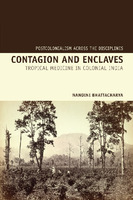Contagion and Enclaves
Tropical Medicine in Colonial India
Author(s)
Bhattacharya, Nandini
Collection
Knowledge Unlatched (KU)Number
100308Language
EnglishAbstract
Colonialism created exclusive economic and segregatory social spaces for the exploitation and management of natural and human resources, in the form of plantations, ports, mining towns, hill stations, civil lines and new urban centres for Europeans. Contagion and Enclaves studies the social history of medicine within two intersecting enclaves in colonial India; the hill station of Darjeeling which incorporated the sanitarian and racial norms of the British Raj; and in the adjacent tea plantations of North Bengal, which produced tea for the global market. It establishes the vital link between medicine, the political economy and the social history of colonialism. It demonstrates that while enclaves were essential and distinctive sites of articulation of colonial power and economy, they were not isolated sites. The book shows that the critical aspect of the enclaves was in their interconnectedness; with other enclaves, with the global economy and international medical research.
Keywords
History; Postcolonial; Bengal; Darjeeling; Darjeeling district; Dooars; India; Kolkata; Malaria; Tea; TeraiDOI
10.2307/j.ctt5vjf2jISBN
9781781386361Publisher
Liverpool University PressPublisher website
https://www.liverpooluniversitypress.co.uk/Publication date and place
Liverpool, 2012-11-20Series
Postcolonialism Across the Disciplines,Classification
Colonialism and imperialism


 Download
Download